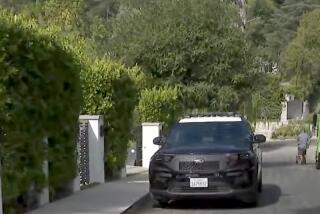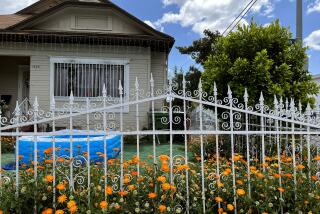Citizen Patrol Reclaims Crime-Ridden Boulevard : Safety: Garden Grove volunteers are out about twice a week with portable phones to alert police. Crime has dropped 30% to 50%.
GARDEN GROVE — For years, Kathleen McGuirk had avoided going out after dark.
The mother of three young girls, she got used to keeping a backpack loaded with clothes and diapers in case someone barged into her home. She splurged on a cellular phone to call for help if confronted by the drug dealers and street people who often roamed her dimly lit street.
McGuirk still has a cellular phone. But now, she’s using it to fight crime before it gets to her doorstep. The 36-year-old homemaker has joined forces with her Larson Avenue neighbors to start a citizen brigade.
About twice a week, McGuirk joins about a dozen volunteers who patrol Garden Grove Boulevard between Magnolia Street and Beach Boulevard from 10 p.m. to 1 a.m. Residents are armed with placards, flashlights and portable phones, ready to report anything suspicious as they stroll past bars, motels and adult bookstores.
The Larson Avenue-based project now has 200 volunteers and 400 other supporters, and Garden Grove police say it is one of the most organized and well-staffed citizen patrol groups in Orange County.
Police and residents estimated crimes such as prostitution, lewd conduct and theft have dropped 30% to 50% in the area since the program’s inception last spring.
Residents also measure the difference the program has made in their lives: They no longer are afraid to walk outside, and they feel as if they have some control over their neighborhood.
“It’s a marvelous feeling,” McGuirk said. “We’ve taken a bunch of neighbors who happen to care about the area and turned ourselves into a community.”
Working with Police Officers Patrick Ryan and Jay Ostrow, the neighbors are part of a group called COPER, or Citizens On Patrol Educating Residents, an extension of a 1993 federally funded community policing campaign in three problem areas of Garden Grove.
The citizen patrol program kicked off with a rally in April, continued every day for three months and then tapered off to two or three times a week after criminal activities had diminished, police and residents said.
“They changed their community when they didn’t have to. Many of them rent and they could have moved away, but they didn’t,” said Marjie Garcia, who doesn’t live in the Larson Avenue area but joined the patrol because she and her husband are opposed to businesses that sell sexually explicit materials.
Garden Grove Mayor Bruce A. Broadwater, who joined the patrol one night several months ago, echoes those sentiments.
“I was very impressed. Obviously, they have made a difference by just being there,” Broadwater said.
In July, one patrol group spotted a man who appeared to be stalking a 14-year-old girl as she walked home from a friend’s house about 10:30 p.m., McGuirk said.
They broke up into two groups. One followed the man and called police while the others stayed close to the girl. The man ran away before police arrived.
“Truly, we felt like we kept something terrible from happening to that girl,” McGuirk said.
The crime patrol largely targets a two-mile stretch of Garden Grove Boulevard that includes adult bookstores and bars nestled between restaurants, car dealers and other businesses.
Nearby are several motels that police have targeted for prostitution sweeps.
Before the community policing program, the lives of many residents revolved around the sun.
“When the sun goes down, they couldn’t go out at night without being fearful,” Ostrow said.
In the morning, residents would find used hypodermic needles, condoms and nude photos littering flower beds and along sidewalks as they took their children to school.
“My daughter would go out to play and find syringes,” said Charles Kelly, a Garden Grove resident for 16 years who is now a team captain with the neighborhood patrol group. “I was afraid she would accidentally hurt herself. I don’t have to worry about things like that anymore.”
*
Business owners differ in their assessments of the crime-fighting efforts. Some complain the group has driven away customers while others support the residents’ goals.
Ted Heier, owner of The Fraternity House in the 8100 block of Garden Grove Boulevard, said he shares his neighbors’ concerns. But he says the city has created parking problems for his customers by prohibiting parking on certain streets between 9 p.m. and about 6 a.m.
Police said the parking restrictions are one of their main weapons against crime.
In response to resident and police lobbying, street lights have been brightened and bushes trimmed. More people have been jailed for prostitution and other misdemeanors, instead of being cited and released, Ostrow said. “We wanted to make it uncomfortable for them to be a repeat offender,” Ryan said.
Police say the presence of the residents probably is the most effective crime deterrent.
Some residents said they have felt scared at times--especially when someone hurls a bottle or insult their way--but not enough to deter them from taking a proactive stand for their neighborhood.
COPER team captains said they are struggling to keep residents interested in patrolling as problems decrease.
“It’s just not a lot of fun to walk around for three hours with nothing to do,” Kelly said. “But we’ve got to maintain what we have. We’ve got to remain involved. The police can’t do it all.”
More to Read
Sign up for Essential California
The most important California stories and recommendations in your inbox every morning.
You may occasionally receive promotional content from the Los Angeles Times.










